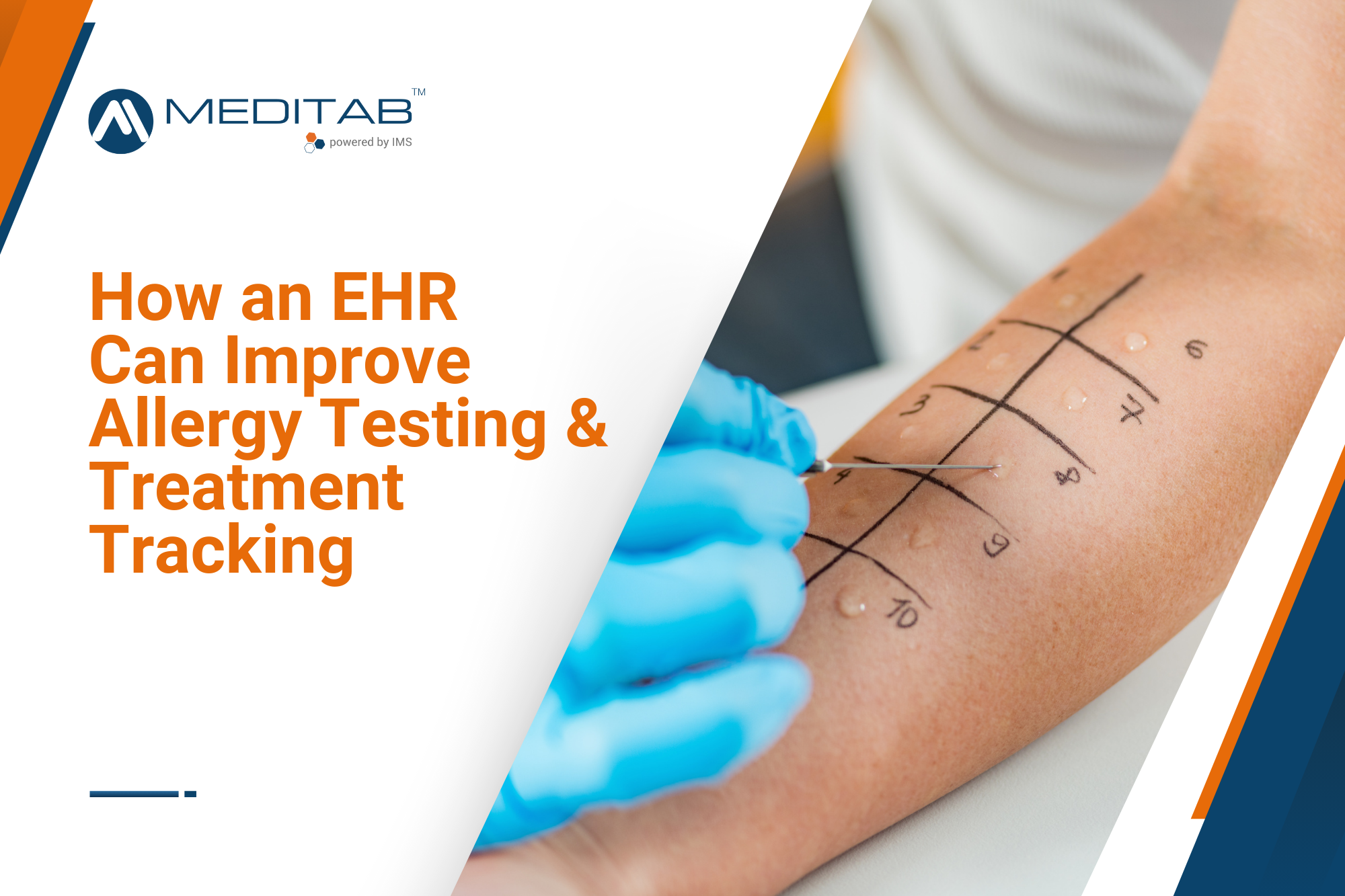How an EHR Can Improve Allergy Testing & Treatment Tracking
Posted by Karen Grace Larsen
Treatment Tracking Software Allergy Clinic Software EHR for Allergists Allergy Testing Management Healthcare Software Solutions
To say that allergies are common is an understatement—in the United States, they’re surging.
According to the latest National Center for Health Statistics data, nearly 1 in 3 adults and more than 1 in 4 children in the U.S. have reported having seasonal allergies, eczema, or food allergies.
With the demand for allergy care skyrocketing, practices must keep pace. To do this, they need more than just their experience and expertise; they also need the right technology.
The adaptation of electronic health record (EHR) systems has reshaped how experts test and treat allergies. From precise test documentation to real-time treatment monitoring, these systems offer a streamlined and precise approach to allergy healthcare.
But how exactly do EHR allergy modules enhance efficiency, reduce risks, and improve patient outcomes?
Let’s take a closer look.
The Evolution of Allergy Testing

The Current Challenges of Allergy Treatment and Testing
For the past century and a half, the field of allergy and immunology has made tremendous strides. Innovations in biotechnology, cloud-based electronic health records, televisits, and AI-driven diagnostics have transformed how allergists identify and manage allergic conditions.
Unfortunately, despite these advancements, many clinics still face significant challenges in accurately tracking test results, managing treatment plans, and ensuring seamless data integration. Some common issues include:
- Data Overload: With multiple allergens tested simultaneously, manually tracking results can be overwhelming.
- Human Error: Misinterpreting or misplacing test results can lead to incorrect diagnoses and delayed treatments.
- Fragmented Records: Inconsistent documentation across different systems can put gaps in patient history and hinder informed decision-making.
- Time-Consuming Processes: Manual data entry and paper-based workflows slow clinic operations down and reduce efficiency.
EHR Integration: The Future of Allergy and Immunotherapy
Modern EHRs are transforming allergy testing and treatment tracking by integrating advanced features that simplify clinic workflows, improve patient outcomes, and enhance compliance.
For example, AllergyEHR, Meditab’s award-winning allergy-focused EHR solution, provides a comprehensive suite of features designed specifically for allergists and immunologists.
Allergy Testing
- Reaction Checking Module: AllergyEHR has an entire module specially designed to make skin testing and vaccine reaction checking as streamlined as possible. Easy to use and fully customizable, the module helps you actively engage with your patients instead of getting preoccupied with documentation and charting.
- Spirometry Solutions Integration: AllergyEHR seamlessly integrates with spirometry and pulmonary function testing (PFT) solutions by Morgan Scientific and ndd. The system helps you run tests more efficiently with customizable dashboards, send test results straight into patient records, and deliver personalized allergy care with pinpoint precision.
- Instant Access to Test Results: No more flipping through paper charts—your team can instantly pull up a patient’s test history and retrieve allergy test results with AllergyEHR. This helps avoid delays and empowers you to make faster, more informed treatment decisions based on accurate and up-to-date patient data.
- Advanced Practice Analytics: Fully equipped with a comprehensive and customizable practice analytics module, AllergyEHR allows you to generate detailed reports for all tested allergens. This helps you analyze data, identify trends, tailor treatment plans, and provide care on a more personalized level.
Allergy Treatment Tracking
- Customizable Treatment Plans: AllergyEHR includes modules for building and tracking immunotherapy treatments (e.g., serum recipe creation, shot administration, vial management, etc.). These tools can help your practice design personalized regimens with adjustable dosing schedules, ensuring each patient receives the most effective skin or seasonal allergy treatment based on their unique sensitivities and response patterns.
- Shot Schedule Template: With an immunotherapy-specific template conveniently built into your EHR system, you can standardize and automate immunotherapy schedules, reduce the likelihood of errors, and ensure your patients get their allergy shots at the correct intervals for consistent and effective treatment.
- Patient Progress Monitoring: AllergyEHR features visit note templates specifically designed for allergy treatment so you can document and track patient responses to immunotherapy over time. This helps you and your team adjust treatment plans as needed and improve long-term outcomes with data-driven decision-making.
- Appointment Reminder Automation: Reduce patient no-shows and missed treatments with automated appointment and follow-up reminders. AllergyEHR automatically sends out text and/or email messages to ensure your patients stay on track and adhere to their seasonal or skin allergy treatment schedules.
Reporting and Compliance
- Reports Generation: AllergyEHR enables you to quickly generate detailed reports for allergy testing, immunotherapy outcomes, and patient progress. This streamlines documentation for regulatory compliance and insurance reimbursement.
- Immunotherapy Billing Automation: With innovative billing features and pre-configured allergy billing codes, AllergyEHR delivers accurate, hassle-free billing. From automated coding to immunotherapy-specific claim submissions, our system reduces your administrative workload and boosts revenue cycle efficiency.
- VaxCare Automation: Simplify vaccine inventory management and billing. With VaxCare integrated into your EHR, you can enjoy seamless ordering, tracking, and reimbursement for immunotherapy and other allergy-related treatments.
- USP 797 Compliance: If your practice prepares allergy extracts, having AllergyEHR as your practice management system helps ensure strict compliance with USP 797 regulations for sterile compounding. By leveraging its automated documentation and tracking features, you can maintain patient safety, regulatory adherence, and operational efficiency.
AllergyEHR: A Shot of Innovation for Allergy Healthcare
From handwritten charts to real-time digital documentation, allergy testing and treatment have truly come a long way over the decades. What once relied on crude trial-and-error methods has now evolved into sophisticated, data-driven care. But the advancement doesn’t stop there.
AllergyEHR stands at the forefront of allergy care’s continuous evolution, helping clinics like yours streamline operations, minimize errors, and optimize patient outcomes.
The future of allergy care is here, and your practice deserves technology that can keep up. It’s time to leave outdated workflows behind and step into a new era of allergy care with AllergyEHR.
Share this post: on Twitter on Facebook on Google+



